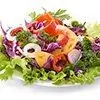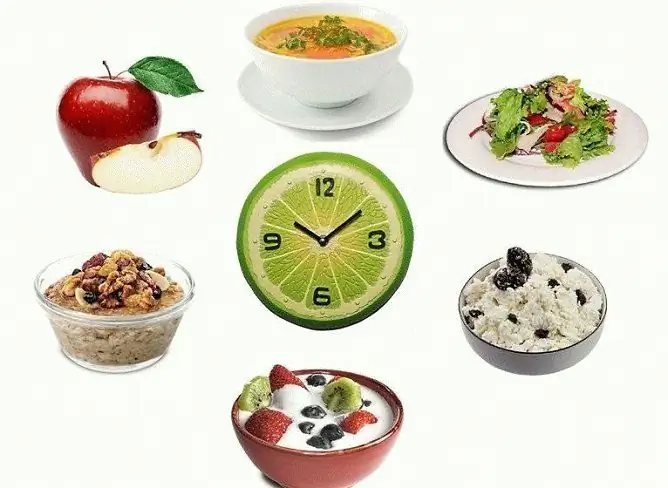12 foods to eat in the evening
The dream of a slim figure can force a person to significantly limit himself in nutrition and radically change his lifestyle. It is not so difficult to adhere to some recommendations of nutritionists: you can easily make a diet that will include foods with a certain calorie content, or get to work by bike. However, there is a requirement that not everyone can fulfill: not to eat after 18.00. The reason is not only the emerging feeling of hunger. If a person returns from work no earlier than 20.00, he simply does not have time to have dinner at the recommended hours, and only a few can do without food from lunch until the next morning. There are also psychological factors: after a busy day of work with its difficulties and stresses, there is a completely justified desire to relax. Eating tasty food is one of the best ways to calm down and take your mind off your work. It is not surprising that many get used to gorge themselves in the evenings, ignoring all the advice of doctors.
Fortunately, the problem has a solution. There are a number of products that can be consumed after 6 pm without the risk of gaining extra pounds. We offer a list of such products to the attention of our readers.
Kiwi
This cute fruit is considered one of the most effective fat burners. Its calorie content is low. It contains a large amount of pectin, which helps to improve digestion and relieve heaviness in the stomach.
Kiwi fruits are rich in organic acids that can be harmful for diseases of the gastrointestinal tract. It is worth using kiwi with caution even if you have allergic reactions to exotic vegetables and fruits.

Source: depositphotos.com
Flounder
Flounder is perfect for diet food. Its meat contains a lot of protein and only 3% fat, mainly in the form of healthy omega-3 and omega-6 fatty acids. The energy value of fish is 90 kcal per 100 g of product. Regular inclusion of flounder in the diet helps not only maintain optimal body weight, but also improve the condition of the skin, hair and nails.

Source: depositphotos.com
Cod
The calorie content of cod is one of the lowest among protein products (69 kcal per 100 g). Fish pulp is rich in iodine, sulfur and vitamin PP, therefore its use has a beneficial effect on the functioning of the nervous system, and also improves blood composition and blood circulation in general. Cod is not recommended to be included in the diet for people who have kidney problems or suffer from cholelithiasis. Doctors have information that cod meat, when consumed excessively, can lower blood pressure.

Source: depositphotos.com
Beet
Red beetroot has a sweet taste and does contain a lot of natural sugars. Therefore, the root vegetable has long been considered unsuitable for those seeking to lose weight.
According to the latest data, the composition of beets is unique: it allows, with regular use, to normalize digestion, fill the body with vitamins and trace elements, improve blood composition and normalize the functions of many organs and systems. The calorie content of the root crop does not exceed 40 kcal per 100 g. Today, several diets are known that include raw or boiled beets as the main component of the diet, providing a significant decrease in body weight.
People with chronic diseases should limit the consumption of beets: diabetes mellitus, oxaluria, frequent diarrhea and gastritis. A healthy person needs to eat beets daily. Among other things, it has a calming effect. By eating beets in the late afternoon, you can relieve the effects of daytime stress and improve sleep quality.

Source: depositphotos.com
Champignon
Mushrooms are considered a heavy food, and yet champignons are not forbidden to eat in the evening: they contain substances that quickly and effectively suppress hunger. This property is especially fully manifested when raw mushrooms are included in the diet (for example, in salads). In addition, they contain essential amino acids, vitamins and mineral compounds.
By adding only 2-3 mushrooms to the evening menu, you will quickly feel full and get a lot of vitamins and minerals without compromising your figure.

Source: depositphotos.com
Cabbage
All types of cabbage (cabbage, broccoli, cauliflower, Brussels sprouts, etc.) contain a large amount of nutrients, they are low in calories and are quite suitable for an evening snack.
When eating cabbage, you need to take into account some of the nuances:
- Collard greens or sauerkraut can cause excessive gas formation in the intestines;
- cabbage is not recommended with increased acidity of gastric juice;
- Cauliflower should not be eaten raw
- cauliflower can worsen the condition of people with gout;
- broccoli and cauliflower can cause allergies;
- eating broccoli can adversely affect the health of people with thyroid problems.

Source: depositphotos.com
Pumpkin
Pumpkin is a storehouse of vitamins, trace elements and fiber, useful for digestion. This vegetable contains a lot of biologically active substances, it is not without reason that it has been used since ancient times to treat various pathologies.
When included in an evening meal, pumpkin has a calming effect on the body: it is rich in substances that help reduce anxiety and get rid of insomnia. The pulp of the fruit is low in calories (22 kcal per 100 g). A few orange slices baked in the oven are great for satisfying your hunger.
Contraindications to the use of pumpkin are considered low acidity of gastric juice, a tendency to flatulence, diabetes mellitus and individual intolerance.

Source: depositphotos.com
Turnip
The energy value of turnips is 30 kcal per 100 g. Moreover, unlike many other vegetables and fruits, it does not have a harmful effect on diabetes. It is recommended to pay attention to the product in case of obesity and excess cholesterol in the blood.
Like some other cruciferous plants, turnip has a calming effect on humans, stabilizing the state of the nervous system. The inclusion of turnips in your evening meal is justified.

Source: depositphotos.com
Celery
There are three types of celery: leaf, petiole and root. They are all low in calories and rich in substances that promote weight loss. It has been found that in the process of digesting celery, the body spends more energy than it receives.
Each part of the plant contains large amounts of potassium, as well as manganese, sodium, phosphorus and calcium, vitamins, essential oils, and polyunsaturated fatty acids. Celery stalks and roots contain a lot of fiber, which has a positive effect on bowel function. The vegetable can be eaten raw, boiled or baked. When used as a side dish, it speeds up and optimizes the protein digestion process. Celery juice mixed with juices of other vegetables or fruits is very popular.
Celery has strong diuretic, anti-inflammatory, tonic, immunostimulating and vasodilatory properties. Therefore, its use in food requires moderation and caution. With hypotension, urolithiasis, varicose veins, epilepsy or gastrointestinal diseases in the acute stage, the use of celery (especially in the form of freshly squeezed juice) can worsen the patient's condition. The product is not recommended for women suffering from uterine bleeding, as well as for expectant mothers, as it contains substances that tone the muscles of the uterus. When breastfed, including celery in your diet can negatively affect the taste of your breast milk.

Source: depositphotos.com
Corn
Corn grains are quite high in calories (108 kcal per 100 g), but they have a wonderful property: thanks to their unique balanced composition, they are digested very quickly and activate metabolism. Therefore, a few tablespoons of boiled corn kernels is a great evening snack. Of course, we are talking about a product bought in the form of a cob and cooked at home. Canned corn is not suitable for dietary nutrition: during the production process, sweeteners and other substances that are not very healthy are added to it.

Source: depositphotos.com
Pear
Many people believe that the easiest way to stifle the appetite that is playing out in the evening is by eating an apple. In fact, the pear is much better suited for this purpose. The apple seems less sweet, but this feeling is created by the organic acids that make up its composition. A pear contains less sugar than an apple, has a lower calorie content, and there are very few acids that stimulate the appetite.

Source: depositphotos.com
Vegetable caviar
Containing a minimum amount of oil, salt and spices, this homemade caviar stew is a very convenient snack ideal for an evening meal. It can include zucchini, eggplant, bell peppers, tomatoes, onions, carrots, garlic, a variety of herbs and even mushrooms. The result is an appetizing dish that perfectly satisfies hunger. The main thing is not to get too carried away and eat caviar without bread.

Source: depositphotos.com
As we have seen, the list of foods with which you can easily comply with dietary restrictions is very wide. So that they bring health benefits and do not cause excess weight, it is important to adhere to the following rules:
- you do not need to consume all the products that we talked about every day. Pick one or two of them for each evening. For example, a piece of fish (cod or flounder) and a little broccoli, slices of oven-baked pumpkin, mushrooms with boiled celery tuber, juicy pear or beet salad with lemon juice;
- Foods selected for an evening snack should be steamed, baked, boiled, or eaten raw. It will be much more difficult to digest fried or smoked foods, which will negatively affect the quality of a night's rest and your well-being;
- when cooking, you should try to minimize the amount of salt and hot spices that stimulate the appetite.
If you need to adjust your weight, this does not mean that you will certainly have to keep yourself in tight hands. Constantly experiencing a feeling of hunger, it is very difficult to achieve the desired result, and the harm from such restrictions is more than good. It's best to pick up the right options for healthy, low-calorie evening snacks in advance.
YouTube video related to the article:

Maria Kulkes Medical journalist About the author
Education: First Moscow State Medical University named after I. M. Sechenov, specialty "General Medicine".
Found a mistake in the text? Select it and press Ctrl + Enter.







